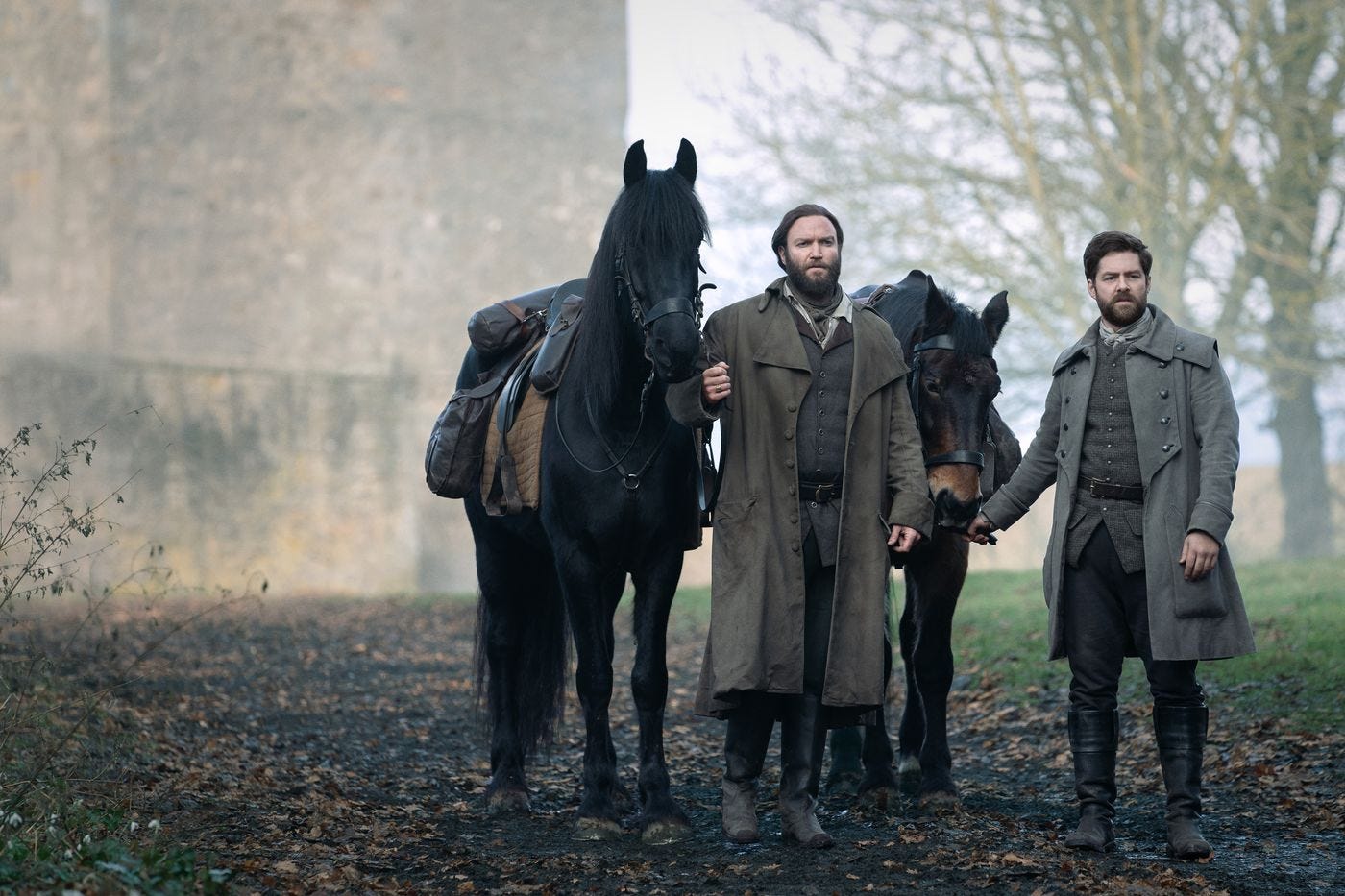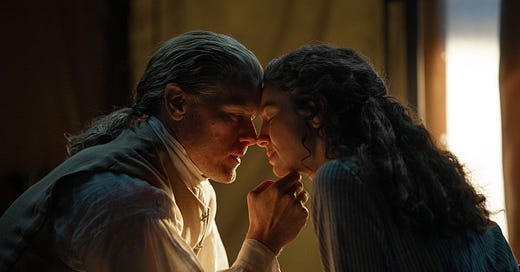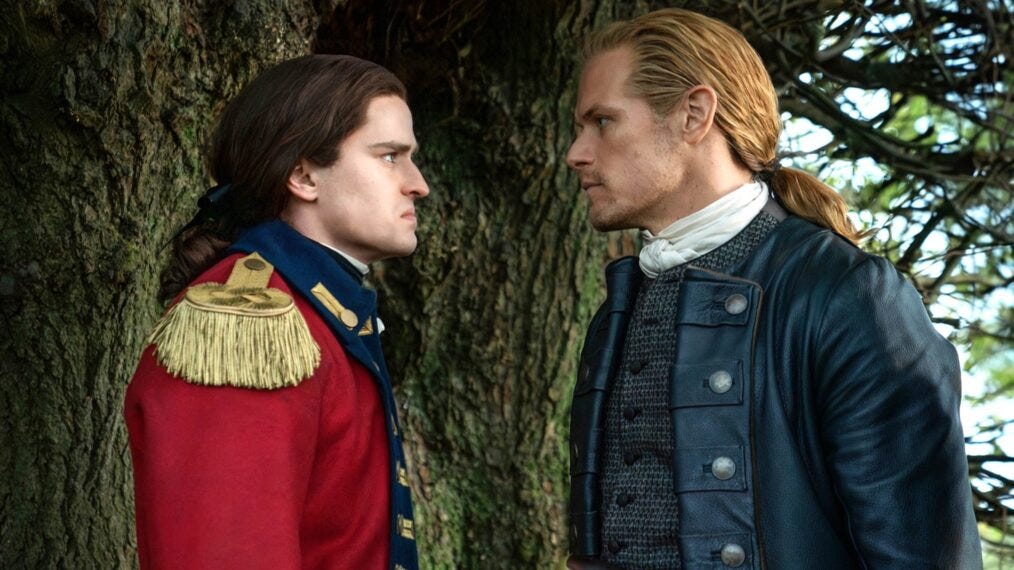Outlander: Season 7, Part II: The Off-Balance Review.
Love, loss and Revolution.
Outlander‘s seventh season concluded last week. If you haven’t seen the season finale just yet?
Please consider this your spoiler warning.
Though if you’re looking for the Off-Balance review of Outlander: Season 7, Part I, you can find it here.
Thanks for reading! Until next time,
Ryan.
Over its decade-plus on the air, to its credit, Outlander has made no secret of the many different fabrics that are apart of its wide-ranging tapestry: sci-fi (time travel, specifically), historical fiction and whatever-it-takes romance.
And though inherently beholden to Diana Gabaldon’s series of long-running novels, in recent years, the show has quietly parsed down the more expansive nature of the source material, in the interest of its own storytelling acumen: an honest adaption yes but not wholly verbatim, either.
This, which became increasingly clear over the show’s extended seventh season, which concluded last week.
Broken into two parts, with a year and a half hiatus in between, it was to see Outlander, despite that stalled momentum, actively pick up the various narrative threads it has put down over the past few seasons.
Good timing, too.
As the seventh ends, the eighth and final season looms, having wrapped filming this past September (with no set release date as of this writing). Meanwhile, the prequel series, Blood of My Blood, is set to air sometime later this year.
The next era of Outlander, as it were, is in sight.
But before all that comes to pass, just how close did this stretch of episodes for the OG series stick the landing?
Well reader, let us discuss.
As the season finale begins, the previous episode’s stinger doesn’t linger long.
When we last saw Claire (Caitríona Balfe) she was clinging to life and bleeding out on the operating table… but a handy time jump quickly puts any worries to rest. Weak though she may be, thanks to Denzel (Joey Phillips), she’ll live.
It is an experience he doesn’t want to repeat he tells her afterwards, operating on a member of his family, someone he loves. Reassuring him, Claire tells him he did wonderfully. It is a nice bookend to their shared arc this season, Denzel, taking all he could from Claire’s mentorship, only then needing to use those very same surgical lessons to save her life.
So as Claire slowly recovers, Jamie (Sam Heughan), having resigned his post in the Continental Army, is a constant presence at her bedside.
Outlander has always been at its best when Balfe and Heughan are simply given the space to put their tremendous chemistry to use and play off each other: even here, when Jamie must help his wife to her feet, so she can relieve herself.
That’s love, man.
And after one of this half-season’s most impactful plot developments had Jamie seemingly dead and lost at sea (if only briefly, for an episode and a quarter), not drawing out the uncertainty of Claire’s recovery is appreciated, in a way.
It is a reversal from Outlander’s mid-seasons, which often languished in their pacing. Over the seventh season, in contrast, the show’s raw storytelling compression has been readily apparent, meaning that it can’t afford to stay in one place for too long.
To this point, in the not-so distant past, Lallybroch is hosting some unexpected visitors: the reunited MacKenzie clan.

Now, did anyone really believe, cliffhanger be dammed, that they wouldn’t find each other?
Well, no, probably not.
But after travelling back through the stones, Brianna (Sophie Skelton) and the kids track down Roger (Richard Rankin) and Buck (Diarmaid Murtagh) in 1739.
And after being separated by centuries for all of Part II, they are, at last, back together.
It works well, everything that preceded it considered: Buck’s impressive character growth and Roger, getting some measure of closure, in meeting his time-displaced father (Nicholas Ralph).
Brianna holding her own when up against a scheming Rob Cameron (Chris Fulton) in the 1980s, the cameo returns of fan-favourites Dougal (Graham McTavish) and Geillis Duncan (Lotte Verbeek) or the simple fact that the show was clearly enjoying being back in its element, at home, in Scotland
Bound by the American Revolution, Jamie and Claire’s story couldn’t stay there long naturally but Outlander got a lot of milage out of having its various Mackenzie's, whatever the time period, adventuring throughout the Highlands.
Though after a meeting with her unknowing grandfather (Andrew Whipp) - a touching moment, also hinting at prequel setup - Brianna tells Roger she wishes to remain in the past, to reunite with her parents. He agrees.
Wherever it takes them, across time and space, they will travel once more.
They aren’t the only ones on the move, however.
As it happens, one William Ransom (Charles Vandervaart) is chasing down a dangerous lead of his own.
Learning from a sympathetic Lord John (David Berry) that Jane (Silvia Presente) is set to be executed for murder, William refuses to accept this: at John’s prodding, he admits he is motived not just by honour but love and sets out to rescue her.
He can’t do it alone, however and with some reluctance, enlists Jamie’s help. You can see the storm of emotions this request brings and Vandervaart, as he has been all season but especially so, over these past few episodes, is particularly excellent.
Part of him wants nothing more than to be close to Jamie, his biological father, the other is furious - at Jamie, at John, the man who raised him, at the world - for keeping him in the dark about this revelation for so long and the offhanded manner in which he learned it. For Jamie, it is much the same. He knows it is too late for him to be any sort of proper father to William but the strained nature of their relationship, regardless, kills him (this, as usual, highlighted with some great subtleties in Heughan’s performance).
A later conversation sees them reach some measure of clarity, albeit, overlaid with unspoken heartbreak on both sides though it is Jane’s rescue that takes precedence.
Sadly, they are too late: she has taken her own life.
After the episode’s cold open saw her proudly refuse to acquiesce to English demands, it is a tragic end to her story. And although her screen time was ultimately pretty limited, Presente quickly established herself as one of the season’s standouts. A jolt of energy for which Outlander, which has struggled at times to fully highlight its supporting cast, made strong use of.
Devastated, William asks Jamie and Claire to watch over Fanny (Florrie May Wilkinson), Jane’s younger sister, for the time being. They agree and with Jamie’s obligations to the war effort seemingly settled, they begin making plans to return to the Ridge in North Carolina, where Rachel (Izzy Meikle-Small) and Young Ian (John Bell) - after grieving the passing of Ian’s dog, Rollo, reveal they are expecting and plan to join them.
Though as John and Jamie, brokered by Claire (finally), resolve the tension that has dominated their dynamic over the season’s second-half, Claire makes a few startlingly discoveries of her own.
Unnerved by a vision during her recovery of the mysterious Master Raymond (Dominique Pinon), as she gets to know Fanny, Claire can’t believe her eyes and ears - could it be, Fanny and Jane’s mother was Faith, Jamie and Claire’s seemingly stillborn infant daughter?
Now, if one is plugged into the Outlander discourse, they may find this development has been somewhat continuous in the fan space. Specifically, unlike the novels, in branding it with heavier intent: as Fanny whistles the same show tune Claire sang to her daughter, one that won’t be written until the 1900s, it can’t help but get the wheels turning, impossible though it may seem… just as the credits roll.
That then, is where Outlander leaves it seventh and penultimate season: with some pieces moved into place, some, not yet and one massive cliffhanger. Though all and all, it was another strong outing for the show, if not wholly perfect.
Compressed, rapid-fire storytelling somewhat diluting its pure emotional beats and. An overarching sense of predictably continue to be present but buoyed by what have always been the show’s strengths - strong fundamentals, terrific acting and a consistent artistic vision that rarely buckles -, it remains one of the most enjoyable watches on television, despite its missteps.
No doubt, Blood of My Blood is meant to tide viewers over somewhat, until the eighth season arrives, whenever that may be. And without Gabaldon’s supposedly tenth and final book to act as a roadmap (still in development, according to the author herself), just how the series will end is a matter of conjecture, as well.
But Gabaldon has been actively involved with the show since the very beginning and so one should expect her input to be a critical, either way, as the adaption is brought to a close.
Outlander has done well however, in setting itself up for success. Though now, it asks once more of its viewers for something they’ve always had a tricky time mastering: patience.







